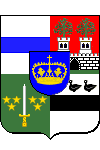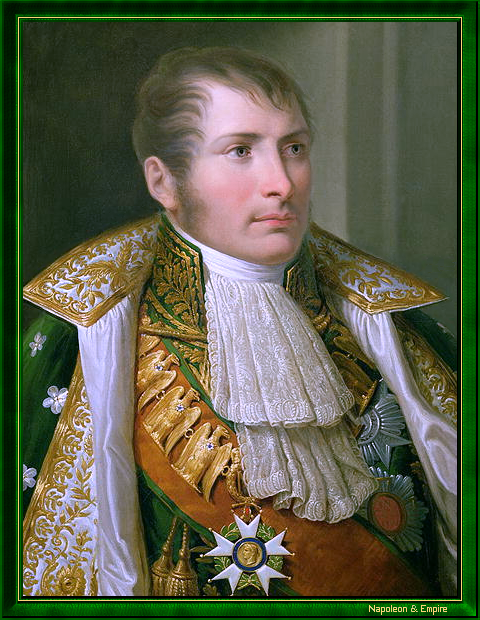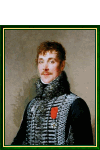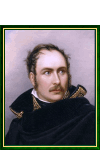Prince Français, Viceroy of the Kingdom of Italy
Pronunciation:

Eugène Rose de Beauharnais was born in Paris on September 3, 1781. He was the eldest child of Viscount Alexandre François Marie de Beauharnais, an officer in the royal army, and of the Creole Marie-Josèphe-Rose de Tascher de la Pagerie. The separation of his parents in 1785 took him away from his sister Hortense. She accompanied their mother to Martinique while Eugène remained in the capital with his father.
From 1789 – he was not yet eight years old – circumstances led him to frequent the highest political spheres. Indeed, his father, deputy for Blois in the National Constituent Assembly, even presiding over it on occasion, gave young Eugène the privilege (admittedly doubtful, for a young boy) of attending the debates of the illustrious areopagus. In 1792, he accompanied his father to the army. The following year, he was apprenticed to a carpenter in order to obey a decree of the Convention which imposed a democratic education on children of noble origin.
In 1794, his father was guillotined and his mother imprisoned. Eugène was taken care of by General Lazare Hoche. The latter removed him from his apprenticeship and took him into his service in Vendée. Eugène carried out all kinds of small tasks for him. The teacher was strict, Eugène wrote in his Memoirs, and the school, for having been harsh, was no less good.
After a few months, his mother, back in favor since the Thermidorian reaction, took her son back and made him finish his studies.
Shortly after Vendémiaire 13, 1795, Eugène, wishing to keep or recover his father's sword – the stories differ depending on whether they are signed Napoleon or Eugène – addressed General Bonaparte. If the latter supports him, his approach was assured of success. Bonaparte has in fact just saved the regime and received command of the Home Army. From this initiative was born the first meeting between Eugène's mother, the future Empress Joséphine, and her next husband.
Six months later, Eugène followed his new father-in-law to Italy. He was now his aide-de-camp. In 1798, he accompanied him to Egypt then returned to France with him on the Muiron to participate in the coup d'état of 18 Brumaire. Shortly after, he asked to join the consular guard. He was successively appointed colonel in 1802 then general in 1804.
On June 7, 1805, the Italian Republic transformed into a kingdom. Eugène de Beauharnais became viceroy, with residence in Milan [Milano].
The following year, on January 14, 1806, he was the first of Napoleon I's relatives to ally himself with a royal family. He married Augusta-Amélie, daughter of the King of Bavaria. The celebration took place in the Green Gallery of the Royal Palace [Münchner Residenz] in Munich [München] [a painting by François Menageot illustrates this ceremony]
Napoleon granted him the title of Prince of Venice, declared him his adopted son and heir presumptive to the crown of Italy. Joséphine hoped for even more.
The viceroy was endowed with ordinary abilities but he was a hardworking and conscientious man. He could also rely on the experienced collaborators with whom Napoleon surrounded him. His administration of Italy gave complete satisfaction to his father-in-law. Eugene's only failure was not being able to endear himself to his subjects. They persisted in seeing him as a foreigner.
Eugene commanded an army in chief for the first time during the Austrian attack on Italy in 1809. He was responsible for stopping the enemy on the Isonzo, a river close to the current border between Italy. and Slovenia. His first attempt was not a masterstroke. The battle of Sacile, against Archduke John, was a defeat. General Macdonald was then deputy to Eugène by Napoleon and restored the situation. Eugène could subsequently march to Vienne [Wien] across the Alps. He took his revenge on the Archduke on June 14 during the Battle of Raab, nicknamed by Napoleon the granddaughter of Marengo and iFriedland. This victory prevented Archduke John from bringing his reinforcements to his brother Charles. Eugene's army, on the contrary, joined up with the bulk of the French forces in time to participate in the Battle of Wagram (July 5-6).
At the end of the year, Eugène was in Paris at the time of the divorce of his mother and Napoleon I. The tact with which he faced the event prevented him from seeing his favor suffer.
The Russian campaign in 1812 gave him the opportunity to cover himself with glory: on July 25 and 26 at the Battle of Ostrovno, on September 7 at Borodino, on November 27 and 28 at the Battle of the Berezina, he behaved like a hero. At the beginning of 1813, he took command of the army, Murat having abandoned it to join Italy (January 13). At the cost of a remarkable retreat, he brought its remains back to Saxony, after having crossed Poland while suffering the combined attacks of the Russians and the Prussians. This reinforcement allowed the Emperor to win the victory of Lützen (May 2).
Eugene returned shortly after to Italy, which the Austrians were preparing to invade. In January 1814, he refused to leave this country to help the Emperor in France, as the latter asked him to do. But his resistance efforts (victory of Mincio on February 8, 1814) were rendered obsolete by the fall of Paris and the abdication of Napoleon I. However, violent riots were still needed to force him to renounce his throne.
On April 26, Eugene fled Italy and retired to Bavaria, to King Maximilian I, his wife's father. The latter granted him the duchy of Leuchtenberg and the principality of Eichstadt. From then on and until the end of his life, Eugène was content to make his fortune grow. Staying in Vienna at the time when Napoleon escaped from the island of Elba, he only avoided arrest by giving his word not to try to leave Bavaria. He therefore played no role during the Hundred Days.
Eugène de Beauharnais died prematurely of apoplexy (we would say today: a stroke) on February 21, 1824 in Munich.
"Eugène de Beauharnais, Viceroy of the Kingdom of Italy" by Andrea Appiani (Milan 1754 - Milan 1817).

His tomb is located in the crypt of the Church of Saint Michael [Michaelskirche] in Munich, in the nave of which a very beautiful cenotaph signed Bertel Thorvaldsen honors his memory.
Arranged by Napoleon I for strictly political reasons, the marriage of Eugène de Beauharnais was, however, particularly happy. The numerous offspring resulting from the couple make them the ancestors of several European crowned heads (Norway, Sweden, Denmark, Greece).



